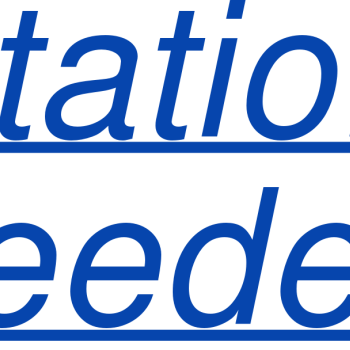Prove It!: A Citation Scavenger Hunt

- Preview |
- Standards |
- Resources & Preparation |
- Instructional Plan |
- Related Resources |
- Comments
Overview
“Prove it!” is a common phrase heard from many teachers to their students during the research and writing process. Having little or no support for specific assertions in a research paper can be troublesome. A citation scavenger hunt is a fun and challenging way for students to practice finding citations that support details about the characters, plot or themes from a text.
Featured Resources
- Citation Hunt Printout: Use this printable resource to guide students and aid them in recording their citations.
From Theory to Practice
Teaching and practicing the appropriate use of citations in research should be taught early and often during one's academic career. Dreher et al. explain that "[S]tudents need to learn creative and multifaceted approaches to research and inquiry. The ability to identify good topics, to gather information, and to evaluate, assemble, and interpret findings from among the many general and specialized information sources now available to them is one of the most vital skills that students can acquire" (39).
Common Core Standards
This resource has been aligned to the Common Core State Standards for states in which they have been adopted. If a state does not appear in the drop-down, CCSS alignments are forthcoming.
State Standards
This lesson has been aligned to standards in the following states. If a state does not appear in the drop-down, standard alignments are not currently available for that state.
NCTE/IRA National Standards for the English Language Arts
- 1. Students read a wide range of print and nonprint texts to build an understanding of texts, of themselves, and of the cultures of the United States and the world; to acquire new information; to respond to the needs and demands of society and the workplace; and for personal fulfillment. Among these texts are fiction and nonfiction, classic and contemporary works.
- 2. Students read a wide range of literature from many periods in many genres to build an understanding of the many dimensions (e.g., philosophical, ethical, aesthetic) of human experience.
- 3. Students apply a wide range of strategies to comprehend, interpret, evaluate, and appreciate texts. They draw on their prior experience, their interactions with other readers and writers, their knowledge of word meaning and of other texts, their word identification strategies, and their understanding of textual features (e.g., sound-letter correspondence, sentence structure, context, graphics).
- 6. Students apply knowledge of language structure, language conventions (e.g., spelling and punctuation), media techniques, figurative language, and genre to create, critique, and discuss print and nonprint texts.
- 8. Students use a variety of technological and information resources (e.g., libraries, databases, computer networks, video) to gather and synthesize information and to create and communicate knowledge.
- 11. Students participate as knowledgeable, reflective, creative, and critical members of a variety of literacy communities.
- 12. Students use spoken, written, and visual language to accomplish their own purposes (e.g., for learning, enjoyment, persuasion, and the exchange of information).
Printouts
Websites
This site gives information on properly citing sources and avoiding plagiarism. The web source also outlines when citing sources is not necessary.
Citation machine helps students and professional researchers to properly credit the information that they use in an easy manner.
This brief handout from the Writing Centre at Wilfrid Laurier University outlines plagiarism and the three major reasons why citations are needed in academic writing.
Preparation
- Choose a fiction text or texts that students will read or have read. Have students complete the text if they have not previously read it. Students will be using this text to find support for claims/citations within the text.
- Look over and become familiar with the Citation Hunt Example Printout.
- Record 10 assertions about the text’s character, plot, or theme, on the Citation Hunt Printout (see the sample for ideas). Make the appropriate amount of copies of the handout for each student.
Student Objectives
Students will:
- evaluate citations and the importance of their use.
- demonstrate the ability to find citations that support specific claims in a fiction text.
- identify the purposes of citations.
Session One
- Begin the session with a class discussion about citations and importance of usage. Ask the students : "What is the purpose of a citation?" (to avoid plagiarism, to assign proper authority to a statement) and "When is the use of a citation appropriate?"
- Explain to the class that an early step in the citation process is finding support for a specific claim. Display to the class three or more of the claims below and ask the students why they need support and where they might find it.
- China is the largest nation in the world.
- A McDonald’s Big Mac® has 550 calories.
- Moose Flanagan and his family move to Alcatraz Island. (Al Capone Does My Shirts by Gennifer Choldenko)
- Rifka has to overcome the hatred of Russian soldiers, as well as, typhus and ringworm. (Letters from Rifka by Karen Hesse)
- Mae Tuck, her husband, and her two sons have looked exactly the same for the last 87 years. (Tuck Everlasting by Natalie Babbitt)
- Inform the class that you are challenging them to a citation competition.
- Distribute and explain the Citation Hunt Catching Fire Example Printout and answer any questions that students may have. Next, give each student a copy of the Citation Hunt Printout that will be used for the text that they read.
- If needed, complete the first statement together. Have students work in pairs or as an individual to complete the challenge.
- Circulate around the classroom making sure that students are recording appropriate citations and page numbers. Help students as needed.
- When all students have completed the activity, come together as a group to share their findings. Have students share their favorite piece of evidence to their classmates. Supporting excerpts from the book can be written on the board, an overhead, or chart paper.
- Have the students take out a piece of notebook paper or use the back of the Citation Hunt Printout to reflect on the following questions that are displayed on the board, overhead, or chart paper.
- Why are citations important?
- How did you find support for the claims?
- Is it wrong to not cite sources? Why or Why not?
- How would you feel if your ideas or work were used without giving you credit?
- Allow the students time to share their reflections with the class.
Extensions
- Before or after this activity, use the Why We Cite Sources in Academic Papers printout as a discussion guide with the class. Focus on the three main reasons why citations are needed in academic writing during the discussion. This extension would be appropriate before the research process begins.
- Create a citation bookmark that can be used while reading to keep track of excerpts that support specific claims. Please see Genre Study: A Collaborative Approach to see a similar use of bookmarks within a lesson and a sample bookmark.
- Have students use Google Books to look up a favorite or popular quotation from a text. Once their excerpt is found have students properly cite the source using the Citation Machine.
Student Assessment / Reflections
- Use the completed Citation Hunt Printout to check for correct support of the specific claims from the text.
- During the class discussion, evaluate students for increased knowledge of citations and when and why they are used during academic writing.
